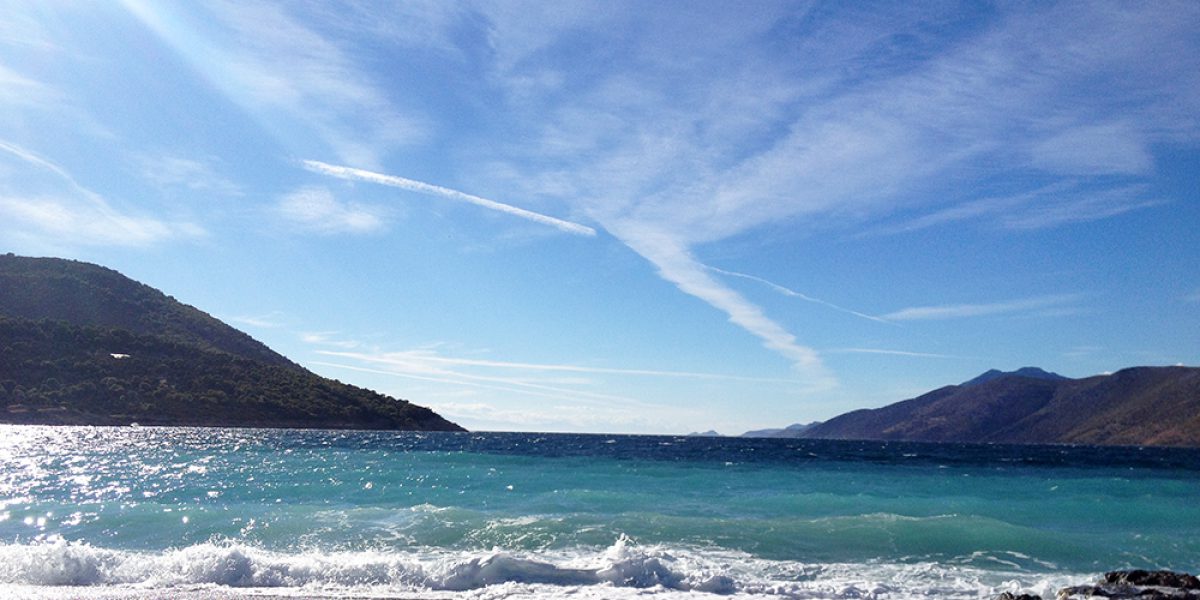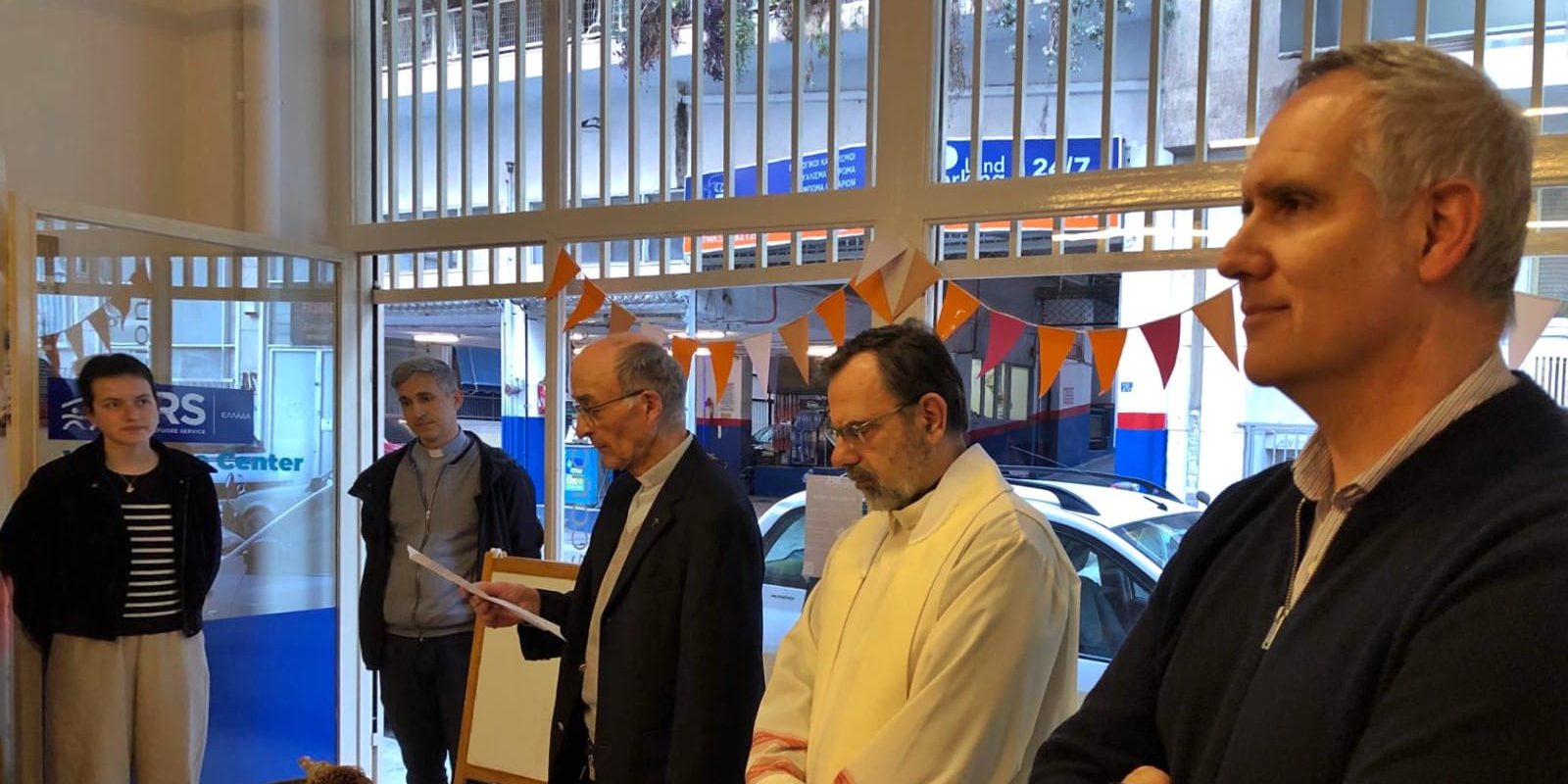What now for Philoxenia – hospitality in Greece?
18 November 2016|Kathryn Doyle, JRS Europe Projects and Advocacy Assistant

Philoxenia. It is the ancient tradition of hospitality and welcome that is as much alive in modern day Greece as it was throughout the country’s long history.
When JRS Greece director Maurice Joyeux agreed to pick me up at the arrivals gate of the Athens airport, I had no idea he would bring company. I expected to be welcomed only by Maurice, but instead Mahsa and Aadela, a mother and her two-year-old daughter, refugees from Iraq and living in the shelter run by JRS Ellada, also greeted me with smiles and broken greetings in English. A late afternoon swim in the Aegean, building sand castles with Aadela and a dinner with a sea view- sharing jackets and scarves against the evening chill- showed me that the infectious spirit of Philoxenia in Greece had spread beyond the Greeks themselves.
Mahsa and Aadela became staples during the two weeks that I spent in Athens, from hearing echoes of “Happy Birthday to Aadela…” sung throughout the halls of the shelter to Mahsa teaching me a dance on the last night of my trip. It struck me how much, this mother and daughter strove for a sense of normalcy and joy in their daily lives despite the hardships of their past and the stress of living in a shelter with 15 other families in a country that was not their own.
While I could have spent my whole trip simply being with the people who lived in the shelter, the demands of my assignment in Athens brought me to such varied places as the meeting rooms of NGOs, the office of diplomats to Greece, and the detention camps housing thousands of people seeking safety in Europe but now stranded in Greece.
Visiting the detention camps, both in Athens and on Lesbos, was a stark contrast to the welcoming, community-like environment of the JRS shelter. Perhaps where this difference was most alarming, was with the Moria camp on Lesbos- infamous both because of Pope Francis apostolic visit in April 2016 but also because of the deplorable conditions, constant clashes between residents and the September 19th fire that swept through the camp.
I saw the effects of all of these things while in Moria and met with the volunteers and staff of the NGOs that are trying to counteract these effects. However, after reading an article in The Guardian, in which the mayor of Lesbos laments that there are too many NGOs working on the island, I became suspicious of the sheer amount of them operating in the camps. Each with their containers as make-shift offices and their logoed vests, which seemingly created more differences between the workers than coordination.
I brought my concern to a young man, named Farzan, that we met living in the camp, he challenged my views with his own perspective, “Its not about what’s written on their backs, but what is in their hearts.” Of course Farzan was right, while good-intentioned people can at times cause more harm then good, his words reminded me of the importance of genuine human presence for the people who were living in the camps. These volunteers, with their containers and vests but also with their footballs, schoolbooks and movie nights, represented the first step in the welcome that people received on European soil. They offered Philoxenia and the kindness that was starkly missing from the barbed wire fences, pre-boxed meager lunches and cold presence of the authorities in charge of the camp.
During my time on Lesbos, this was far from the only time Farzan gave me pause. The next day, our small group met up with him again to learn more about his story. Farzan’s story starts in Iraq, where he left his family as well as his studies behind out of fear of being recruited by ISIS. Making his way to Turkey, Farzan said that he, “sold his life to the smugglers” in June and made the dangerous crossing from Turkey to Lesbos by small raft in the middle of the night and into the early morning. It was a blessing for him that the sea was calm.
Four and a half months later Farzan is still in limbo, waiting in the Moria camp for his first appointment to register for Asylum, something he found out won’t take place for another two months. Even then, he expects his application will be denied as he is Iraqi and arrived after the EU-Turkey deal took effect. In order to not lose hope, Farzan stays very active, acting as a translator and volunteering with medical and educational programs in the camp. He knows five languages and is teaching himself more. He also writes poetry to express the harsh day-to-day realities of his life.
I observed a clear shift for Greece as a country of first arrival and transit to a long-term-hosting society with the integration of migrants coming to its shores within its sights. The need for the integration of refugees into society comes with the rising number of asylum claims to stay in Greece. While Mahsa hopes to apply for family reunification with her husband in Germany, it is the goal of Farzan to stay in Greece and become a useful member of their society. These dreams of a life of stability and normalcy in Greece and in Europe as a whole will not be without their challenges.
While making our way to the airport and reflecting on our time in the islands, Cecile Deleplanque, JRS Greece’s advocacy officer related, “The Greeks say Philoxenia, Philoxenia all the time but there is also xenophobia that no one is talking about.” Although challenging, true hospitality is a long-term commitment. There is more work to be done, work that JRS is well positioned to do.
—
By Kathryn Doyle, JRS Europe Projects and Advocacy Assistant
All names of refugees changed to protect their identity

